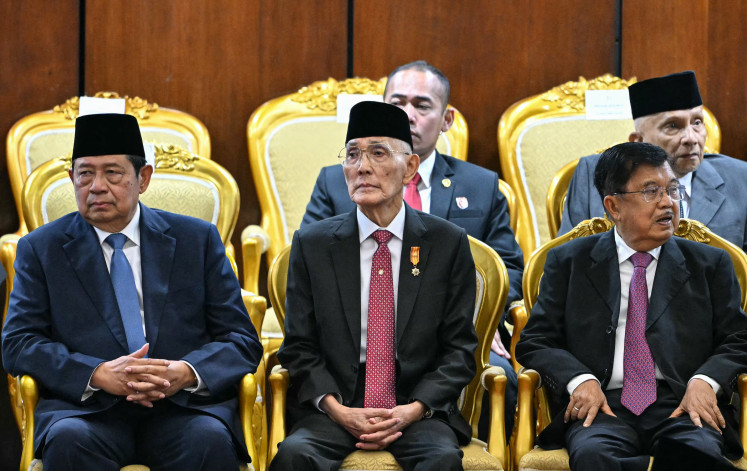Popular Reads
Top Results
Can't find what you're looking for?
View all search resultsPopular Reads
Top Results
Can't find what you're looking for?
View all search resultsLights out for civil servants as President Prabowo cuts budgets
Many government offices in the capital Jakarta are now turning their lights and air conditioners off immediately when the work day ends at 4 pm, leaving some employees trying to finish projects after hours at dimly lit desks, while others are being encouraged to work from home to save on energy costs.
Change text size
Gift Premium Articles
to Anyone
F
rom office lights switched off to out-of-service lifts, civil servants are feeling the pinch after President Prabowo Subianto ordered sweeping budget cuts across government that he said will fund his big-ticket campaign pledges.
Many government offices in the capital Jakarta are now turning their lights and air conditioners off immediately when the work day ends at 4 pm, leaving some employees trying to finish projects after hours at dimly lit desks, while others are being encouraged to work from home to save on energy costs.
The tightening of ministerial belts comes after Prabowo in late January ordered cuts to save Rp 306.7 trillion ($18.8 billion) on office spending, ceremonies and business trips.
The order left ministries scrambling and some officials in the dark, with analysts saying the sudden move was likely to shift funds to programmes like a $4.3 billion free meal plan for schoolkids and a new sovereign wealth fund.
"Can you imagine working in the office, only your room is lit, everything else is off?" a 35-year-old civil servant told AFP.
"There's no sound. It's really dead silent. It makes a different atmosphere."
Patrolling guards have also begun switching off electronic devices after work hours, following an order for employees to leave on time.
"There was a circular telling (workers) they must go home at 4 pm. There is an appeal to leave the office soon and turn off the AC and all electronic devices," said the civil servant, who requested anonymity for fear of professional reprisals.
"Before, there were no patrols. Now the conditions are darker, the AC temperatures have been set."
Prabowo, who took office in October, has said he wants to raise around $46 billion from cuts to government spending and by taking from the dividends of state-owned enterprises.
"Our children must not be hungry... Our people, our children, must be well-fed," Prabowo said last week.
The budget slashing has left the public works ministry with less than half the initial $6.8 billion it was allocated this year, while the home ministry saw its budget cut more than 50 percent to $128.6 million.
As the cuts squeeze workers in many government offices, a presidential spokesman said Wednesday that the government would host a week-long mountain glamping retreat for hundreds of regional officials -- costing $808,000 from the home ministry budget.
The gathering has prompted criticism from civil society groups, including one which called Prabowo's cuts "counterproductive and insensitive" to the needs of society.
'Counterproductive' cuts
Government employees now have to chip in for previously covered necessities such as drinking water and premium Zoom accounts, and others can no longer take business trips, bureaucrats said.
"We previously could use taxis for meetings outside the office. Now we're paying out of our own pockets," said a 33-year-old civil servant who also requested anonymity.
A Constitutional Court official told lawmakers last week that the deep cuts meant wages could only be paid until May.
In one ministry, long queues have been forming for elevators on a daily basis because fewer were running after orders by top officials to limit energy costs.
Workers complained to AFP that the cuts were not just inconvenient but counterproductive to their work, pointing to examples like the internet bandwidth being reduced while being ordered to hold more meetings online.
"Our hope is that this efficiency should not be counterproductive and contradictory," said a 46-year-old worker.
The austerity measures have also sparked thousands of student protesters to rally across the country this week, underpinned by a social media movement known as "Dark Indonesia".
Free meals
Economists say the swathe of cuts is also being driven by a need to repay around $49 billion in debt this year, including about $43 billion in government bonds set to mature.
"This makes our budget really stretched," said Yose Rizal Damuri, executive director of the Jakarta-based Centre for Strategic and International Studies.
But the cuts are also likely to free up funds for Prabowo's ambitious campaign pledges.
"What we know now is... first, free nutritious meals," Yose said.
"Second, to fund Danantara Indonesia," he added, referring to a new sovereign wealth fund due to be launched next week modelled after Singapore's investment arm Temasek.
Prabowo last week said $20 billion of the savings would be injected into the fund.
A reduction in government and social spending could have wider impacts with much-needed funds for health and education potentially redistributed, said Dedi Dinarto, senior associate at public policy advisory firm Global Counsel.
"With the reduced allocation for the health and education sector, this could lower the quality of human resources in the long term," he said.
In some government offices, the cuts are already being felt by breadwinners.
"It affects workers financially," said one of the civil servants.
"There is a sense of injustice."











